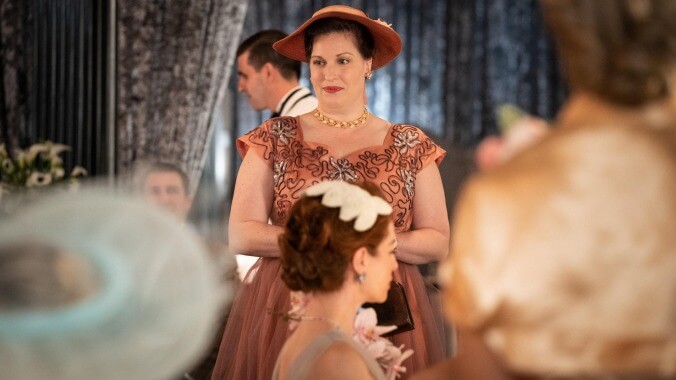Cherry has woven quite an intricately tangled web here among our small cluster of core characters. Yes, Vern and Dee’s relationship still seems shoehorned in (“I’ve given this a lot of thought” he says before their engagement, somehow over the course of about 24 hours), but their sped-up connection is necessary to keep those story wheels turning. The lame Scooter is now at the center of plots featuring Dee, Rita, and Catherine, although with Catherine he shows more charisma than he ever has.
But Cherry knows that the most popular soap characters were always the ones you love to hate (or hate to love). Evil Queen Lana Parrilla has already proven that she could excel in such a part, and she definitely does not disappoint here. The most interesting parts about Rita aren’t when she’s just being straight-up bitchy, to Catherine or Alma, but when she’s not. She’s surprisingly sympathetic to pregnant Dee this episode, so much so that it immediately draws curiosity. The line about not letting one mistake ruining your whole life appears to be a clue, as does the allusion to Harry, a tough guy who ran afoul of Rita and her cousin Isobel in Galveston. (That reveal was intriguing; less so was the revelation that Rita and Isobel are cousins, which was pitched in such a way as to be shocking, but really wasn’t.)
Could the tides be turning for our two captivating female leads? After all, Jack Davenport starts the episode by chronicling the external changes that help to indicate that Alma is a whole new person on the inside as well. Like Rita, she is duplicitous: To someone like Grace, she still seems like the same old Alma, hiding the shocking cruelty that Rita’s treatment has awakened inside of her.
This is where the show would likely be faltering if not for the superlative skills of Allison Tolman in her performance as Alma. She completely sells Alma’s transformation from dowdy housewife (naturally, she wasn’t destined to stay in that role very long), as well as the roots of that evolution. Rita publicly humiliated her, threatened her family, and possibly most destructively, robbed her of her meager little ream to enter the Elysium Park Garden Club. It’s possible that Alma’s discovery of Bertram’s sordid hobby also helped to warp her inner conscience: If the best person she knows is capable of such acts, why shouldn’t she be?
But, in another interesting exploration in Why Women Kill, Bertram in his own way may be actually more commendable than Alma. Yes, he has been killing people, but only to put them out of their suffering (and, due to an extremely screwed-up childhood through no fault of his own), and he wants to stop now that he realizes that these acts fulfill his needs more than theirs. Alma’s prodding of Bertram to off Carlo only serves her own purposes—after all, even though Alma couldn’t hav known this, all indications are that Carlo would have recovered eventually, which would have been more painful for Rita than anything else. In season one of Why Women Kill, that titular questions was answered for a variety of understandable reasons: self-defense, deserved revenge, even, in the case of Lucy Liu’s Simone and Davenport’s Karl, compassion. Alma and Rita are actually the first wives we’ve seen who are veering straight into evil territory, even though they both have their reasons for doing so.
Naturally, all of this comes to a head in a hijinks-filled sequence at Rita’s massive house: the Catherine-Scooter hookup, photographed by Vern; Carlo’s death, delivered by Bertram; Alma planting evidence to frame Rita. The tightly wound characters make perfect sense, but also propel these energetic plots forward: There’s no way that one of Vern’s photos won’t show Alma and/or Bertram in the background, a.k.a., his future in-laws. So then what will he do?
Stray observations
- Again, if Alma had to make her own dress in episode one, where did her fancy new wardrobe come from? The lipstick, the manicure, the jewelry, the hats?
- Favorite frocks: Nevertheless, Alma’s final ensemble this episode: the dark red dress with matching gloves and hat was straight-up breathtaking, It also helps to indicate her switch over to the dark side, because you’ll notice that Rita also favors red, as in her satin halter dress this very episode. Two very different red dresses, but both indicate that these characters are willing to tweak the laws of morality to get what they want.
- The swears kind of stick out in a funny manner. Maybe because this is supposed to be a kitschy period piece, where people say, “good heavens,” so the F-word seems misplaced.
- Shouldn’t Alma be worried about having workmen working on her garden with a dead body out there?
- Also, wouldn’t Bertram have known something was wrong with the plan when Carlo lashed out, clearly not wanting to die?
- Scooter walks right out of the shower with dry hair.
- Next week: Carlo’s death gives way to a whole new wave of intriguing plot developments.












![HBO teases new Euphoria, Larry David, and much more in 2026 sizzle reel [Updated]](https://img.pastemagazine.com/wp-content/avuploads/2025/12/12100344/MixCollage-12-Dec-2025-09-56-AM-9137.jpg)




























